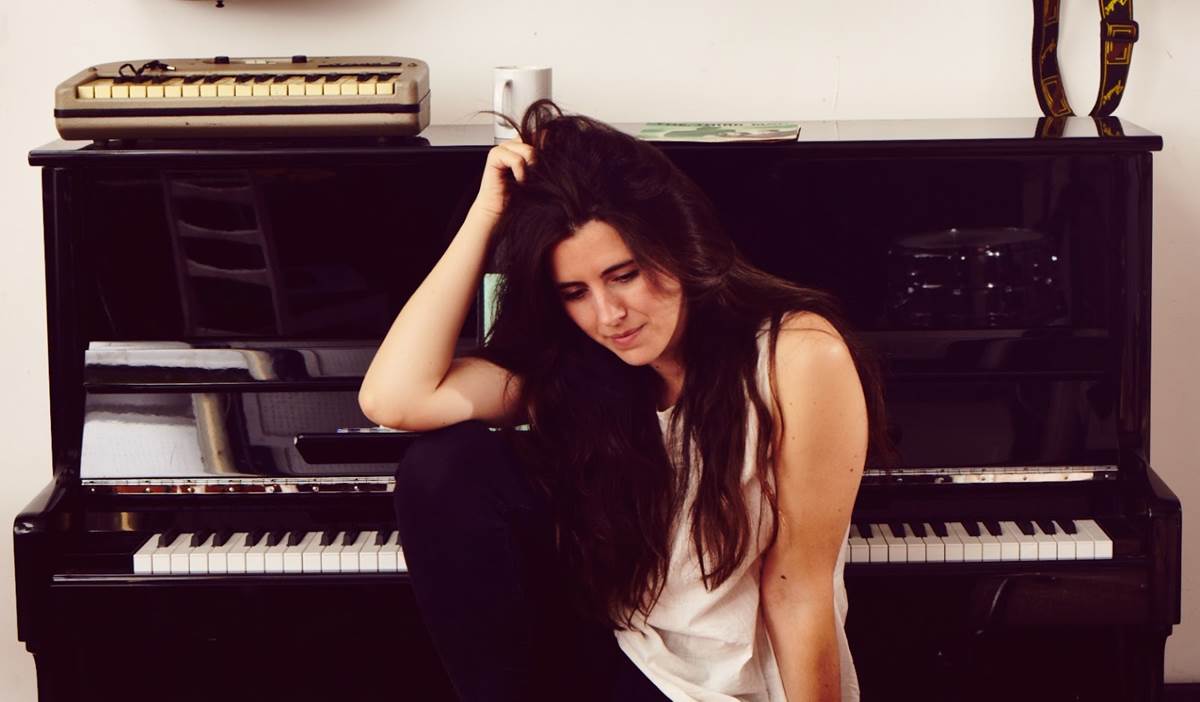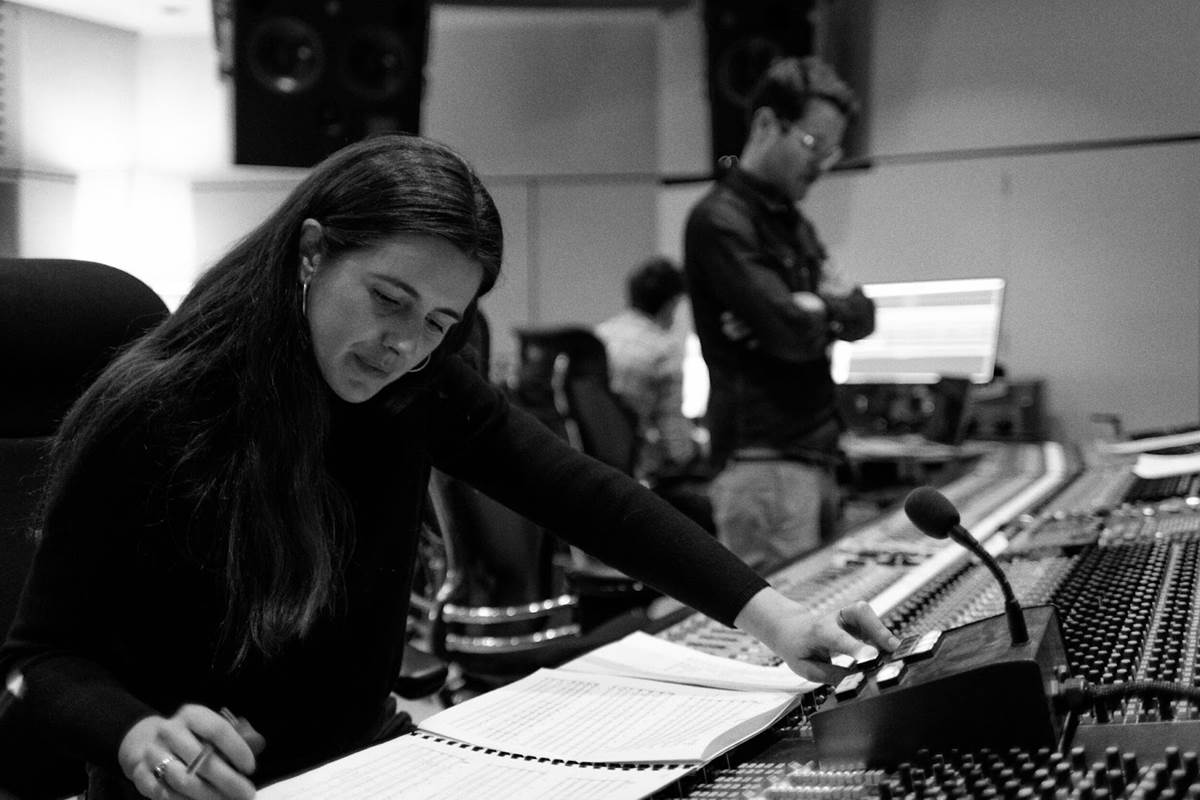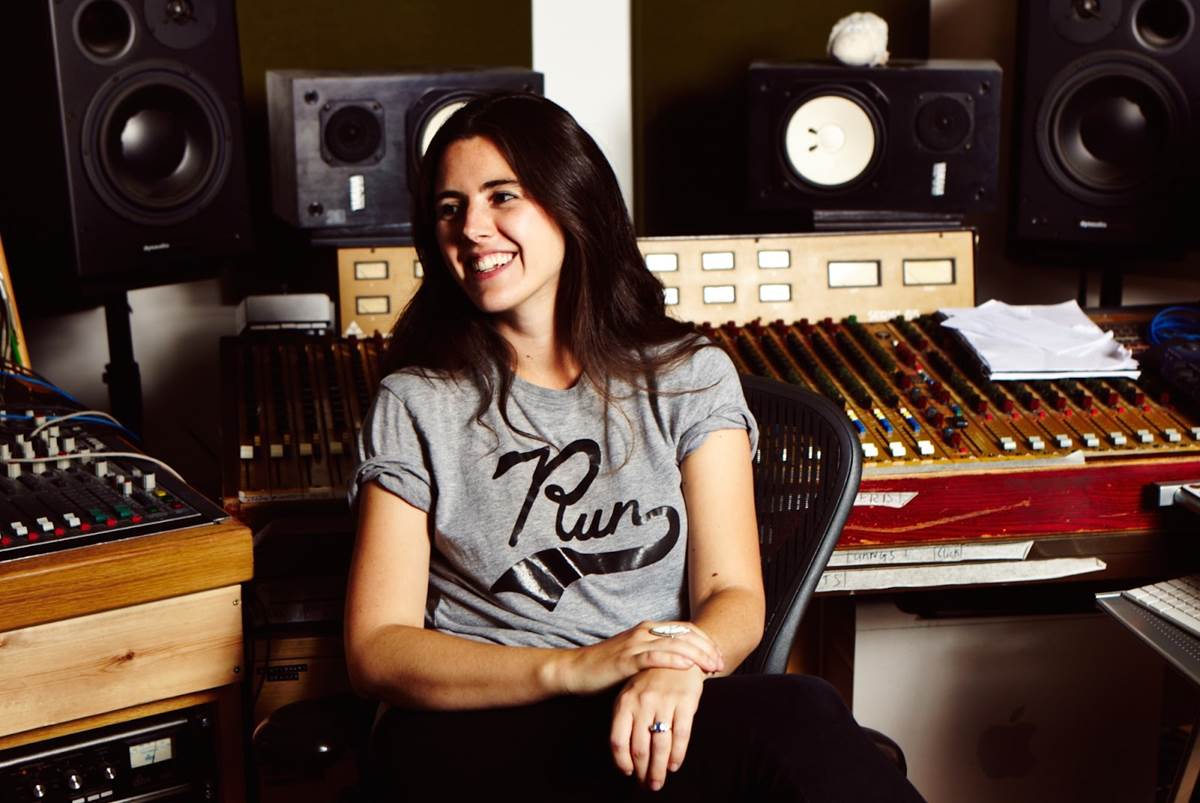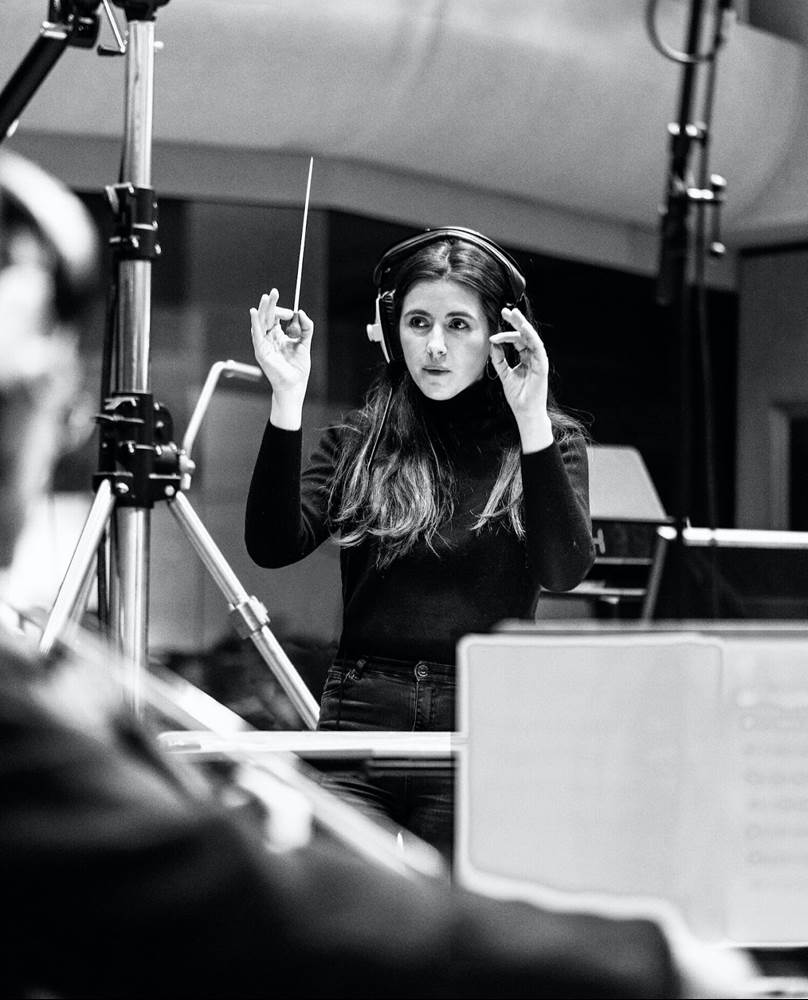Film score composer Natalie Holt has been working in television and movies for about a decade, but over the past couple of years she’s become an increasingly well-known name in the industry thanks to her memorable contributions to Marvel Studios’ Loki and Lucasfilm’s Star Wars: Obi-Wan Kenobi series on Disney+.
I had the wonderful opportunity to speak with Natalie Holt via Zoom this week to discuss her music for Obi-Wan Kenobi, Loki, and the new Hulu movie The Princess.
Mike Celestino, Laughing Place: Did you grow up wanting to be a film composer?
Natalie Holt: Pretty much, yeah. I think so. John Williams is responsible, basically. [laughs] I told him this. I heard [the score from] E.T., and I just remember that was the first time that I noticed music in film. I had the theme in my head. Noticing John Williams was the thing that really made me aware that it was a job or something that I could do. Then I learned an instrument and went to film school, and had to play [violin] for a few years because I couldn’t get a job [composing]. I was playing on other people’s soundtracks, in session orchestras. And then I assisted Martin Phipps– he’s the composer that’s scoring The Crown at the moment. So I worked for him for a few years, and that led to me getting my own gigs.
LP: Outside of John Williams, who were some of the other composers you admired?
Holt: When I was really young, I was listening to lots of Mozart and classical composers as well, because of the music that I was learning. I remember having a tape [of] Mozart’s symphonies, and I used to try and conduct it. I really loved Beethoven and analyzing classical composers as well, because I came from playing and studying music. I guess I was more into Mahler and studying symphonic classical composers than I was into film composers at a younger age. I got into film composers a bit later on.
LP: Before your work on Disney+, you already had an extensive filmography composing for short films, television, and features. How did you get started on that career path?
Holt: Well, the short films were from my time studying at the National Film and Television School and those connections there– making friends and scoring your friend’s short. Then one of the directors that I worked with at film school got a pilot, so I scored that for him. You know, one thing leads to another. The last couple of years have so exceeded what I thought I was capable of. I mean, I thought maybe I’d be able to work in the industry somewhere, but I didn’t ever envisage having my name next to John Williams in Star Wars titles. [laughs] That’s been really crazy.
LP: I first noticed your name on Marvel Studios' Loki, which had a really unique and engaging score. What was your approach to this offbeat project?
Holt: The Loki score just tied together loads of mismatched ideas that I had, which all seemed to go with the story, like that sort of faded analogue 70s sound of the synths, plus the theremin, plus some big Wagnerian orchestral things. Mobius, when I read his character, I just had a really strong [idea for] his theme: he’s listening to power ballads as he’s on his jetski. I imagined he’d be listening to Bon Jovi, so then his theme was on the guitar. And [with] Loki’s mother, I felt like I wanted to bring in some Scandinavian folk instruments. All these different elements seemed to come together and help, because you’re telling a story that’s encompassing all of time– that sort of frenetic, picking bits and bobs, tapas nature of the sound palette that I was using seemed to just go with the storytelling.
LP: Let's talk about Star Wars. How did you first come to be involved with the Obi-Wan Kenobi series?
Holt: I think Deborah [Chow] and Kathleen [Kennedy] heard some of my work from Loki. Kathleen’s very hands-on with music. Also [they heard] some of my more emotional scores, like [Fever Dream] and My Mother and Other Strangers– some things where I had done more emotional string writing. Because Deborah wanted [Obi-Wan Kenobi] to have a real heart and be quite simple and melodic, telling this lonely, desolate story of a man in the desert. She definitely didn’t want some kind of quirky score, but she could hear from the Loki score that I could write melodically and that I had that range that was required for the show. So that was how I came to the job.
LP: Once you were on board, what was it like working with her and how else did you set about creating a score to match the tone she created for the series?
Holt: When I got the job in December, Deborah said, ‘Let’s just hang out for two days and watch through all six episodes. If you have some ideas, bring them along and we’ll have a deep dive and discuss everything.’ So we had these two days together and I kind of felt like I was getting into her vision and her taste. Her instruction at that point was, ‘We don’t know if John Williams is going to let us use any of his themes,’ because he has to grant permission. He didn’t grant permission for Rogue One or The Mandalorian. He did for [Solo: A Star Wars Story], because obviously John Powell co-wrote with [Williams’s] theme on that. But we weren’t sure at [that] point whether he was going to be on board or not, or whether we were going to be able to use anything [from his scores], so Deborah was like, ‘I think we need to just score it as if we can’t [use them], and just come up with our own sound, and see what happens.’
That was how we started off, and then a month [into the process], John Williams had lunch with Kathleen Kennedy and said, ‘I’d love to write Benny a theme.’ He was the one heritage character that John Williams had not scored a proper theme for, because he died so early on in A New Hope. So then he was on board, and because he wrote the [Obi-Wan Kenobi] theme, he watched [the series] all through and pinpointed areas where we could use [his other themes] as well, like in [Part VI]. I was told, ‘This is going to go here, but you can score this bit.’ It wasn’t my choice of where it was going. That all came from other places, because there are so many people [working on the score]. John Williams has got a team that [was] involved as well, like Bill Ross. They’ve got 40 years of Star Wars experience, so you’re in safe hands with these people.
They were checking everything and making sure that we had the right balance of old and new, and the right level of Star Wars. They know that balance, but I don’t think you can please everyone with that stuff. For us, it felt appropriate that we were leading to Vader. He’s not [the] full Vader that we know in A New Hope yet, because he’s still half Anakin. He says in [Part VI], ‘You didn’t kill Anakin Skywalker. I did.’ Then we hear the ‘Imperial March,’ and it feels like it’s really earned at that point. Now he’s controlling his rage and he’s got it out of his system, so we wanted that Vader theme to just be like pure, raging, dark depths. I did use the rhythmic element from the ‘Imperial March’ underneath, but everything over the top was more sound design– a hunting horn and slowed-down double basses– really gnarly, deep orchestral stuff.
LP: Once you heard the new Obi-Wan Kenobi theme that John Williams wrote, did that affect the score that you had already written for the series?
Holt: Yeah, definitely. I think that having John’s input into the series just helped me [know] where I was going. I knew how to see things. He set the tone with that theme, and so I used more conventional orchestral instruments. It helped give the tentpoles for the show, so that was great. Because before that, it was kind of, ‘What’s the balance here?’ and ‘How are people going to react?’ [When] you hear something like The Mandalorian score [by Ludwig Göransson], it’s so fresh and unusual, but it’s also a character that hasn’t got that legacy, so you can live in that new space. But we’re in a different area here, so it was really difficult finding the right balance.
LP: Speaking of audience reactions, what was it like seeing the premiere of Obi-Wan Kenobi at Star Wars Celebration this year?
Holt: Oh, it was amazing. It was just such a buzz to hear everyone laughing. Everyone seemed so happy with it in that room. I loved watching [Part II], hearing that opening shot of Daiyu on those big speakers. It was awesome.
LP: Of the 31 tracks from Obi-Wan Kenobi that have been released online, do you have any particular favorites? Which specific pieces from this series stand out to you the most?
Holt: That’s really hard. I think ‘Days of Alderaan’ I’m quite pleased with. I like how that turned out, because Alderaan’s a sort of mystical place that we haven’t seen before. It took a while to get to the heart of what Alderaan should be. Deborah was saying it’s a ‘new tech’ kind of place– it’s very clean, and it’s probably running on green energy. It’s a socialist environment, but [the Organas] are also royalty and [Leia] is a princess, so [the music] is meant to have some kind of royal element to it. But it shouldn’t be pompous. They’re royals that we can relate to, so [the process] was finding the right way to give them a bit of fanfare that was down-to-Earth. That was a challenge, scoring that section, but I was really happy with how the Alderaan theme turned out.
LP: Music is such a big part of what people have loved about Star Wars from the very beginning. How does it feel to have become part of that legacy?
Holt: It’s a huge career high for me. Having done Loki before, there wasn’t anything established [for that world]. Every Marvel film is quite different, and there’s not a house style. So it is quite intimidating coming into a project where it’s been the sound of your childhood, and [among] the only other composers [who have worked in the Star Wars franchise] are John Powell and Michael Giacchino. It’s very overwhelming, but incredible. I just hope we got the right balance between the old and the new, and did it justice. John [Williams’s] theme is just perfect. He’s 90 [years old], and I read that he’s winding down a little bit now, so it feels like a huge, meaningful thing that I got to work with him in his later years. To have met him, and seen him conducting– I was on the Zoom when he recorded the theme on his 90th birthday. His rapport, the way he was treated by the musicians– everyone has the utmost respect for him, including myself. We all just feel like if we could be half as ‘with it’ when we’re 90, it would be a huge achievement.
LP: Your next project for Disney is The Princess, available on Hulu now under the 20th Century Studios banner. Tell me a little about that film and your contribution to it.
Holt: That film slipped in before [Obi-Wan Kenobi] came along, so I was sort of doing them at the same time. Which was unusual, but kind of handy because the two scores are very different. Le-Van Kiet, who directed The Princess], he’s from Vietnam and he’d done this movie called Furie, which I think Fox saw and loved his shooting style. He shoots these action sequences in a really stylized, frenetic way. It’s basically like Kill Bill with a princess. It’s a fun one. And the score is kind of like a medieval / electric guitar mash-up.
LP: The scores for Loki and Obi-Wan Kenobi are available to stream online, but I'm curious if you are hoping to see vinyl or CD releases of this music from Disney? Or are you okay with the idea of physical media becoming a thing of the past?
Holt: I’d love a vinyl. I’ve heard that Loki’s on the list to be doing a vinyl release. I wonder whether they’ll maybe time it with season two. I’m not sure, but it’s definitely coming out. I just saw something today [about] a physical release [for Obi-Wan Kenobi]– CDs and things. Fingers crossed.
The soundtracks for Loki and Star Wars: Obi-Wan Kenobi are available to stream online. The full audio version of this interview can be heard in this week’s episode of Laughing Place’s Star Wars podcast “Who’s the Bossk?”




